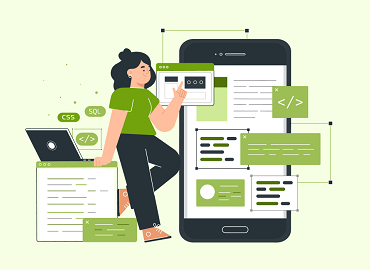Top Industries Benefiting from Mobile App Development Services in 2025
By Cummins Harvard
In 2025, mobile apps have become more than just digital tools — they’re essential components of business infrastructure. From AI-powered customer support to on-demand services, mobile app development services are transforming how industries operate, engage users, and scale their businesses.
Whether through native or cross-platform solutions, businesses across every vertical are leveraging mobile technology to automate processes, deliver better user experiences, and gain competitive advantage.
In this article, we explore the top industries benefiting from mobile app development services in 2025 and how they’re using mobile innovation to thrive.
1. Retail & E-commerce
Retail has seen one of the biggest digital transformations thanks to mobile apps. In 2025, most consumers shop, browse, compare, and purchase directly from their phones.
Key Benefits:
- Seamless in-app purchases
- AI-powered product recommendations
- Loyalty programs & digital wallets
- AR for virtual try-ons or previews
- Push notifications for personalized offers
Example: Major brands now integrate AI chatbots and voice shopping directly into their mobile platforms for hands-free, efficient shopping.
2. Healthcare & Telemedicine
Mobile apps are revolutionizing patient care, bridging the gap between doctors and patients through telehealth services.
Key Benefits:
- Online appointment booking
- Virtual consultations & video calls
- Medication reminders
- Health monitoring with wearables integration
- Patient data and prescription access
2025 Trend: Healthcare apps now incorporate AI for symptom checking and predictive diagnostics, helping doctors intervene faster and more accurately.
3. Finance & Fintech
The finance sector has become mobile-first, with apps now handling everything from basic transactions to crypto trading and wealth management.
Key Benefits:
- Real-time banking and payments
- Biometric authentication for secure access
- AI-driven financial insights and alerts
- Investment, loan, and insurance management
- QR code and NFC-based transactions
Emerging Trend: Mobile apps are embedding conversational AI for customer service, loan approvals, and smart financial planning.
4. Education & E-learning
Remote learning surged post-pandemic, and in 2025, education apps continue to enable accessible and interactive learning experiences.
Key Benefits:
- Live video classes and lecture recordings
- AI-based personalization for adaptive learning
- Gamified content for engagement
- Real-time assessments and progress tracking
- Offline access to study materials
Insight: Universities and EdTech companies use mobile apps not just for students, but for teachers and parents to collaborate in real-time.
5. Logistics & Transportation
From delivery tracking to fleet management, logistics firms are digitizing their operations through mobile apps to improve efficiency.
Key Benefits:
- Real-time GPS tracking
- Fleet management dashboards
- Predictive route optimization
- Delivery status updates and alerts
- Warehouse integration
Advancement in 2025: Many logistics apps now include AI-powered demand forecasting and voice-enabled driver communication tools.
6. Travel & Hospitality
Mobile apps in travel help users plan trips, book accommodations, and manage itineraries with ease.
Key Benefits:
- One-click bookings for flights, hotels, and rentals
- In-app customer support and chatbots
- Real-time updates on travel status
- AR for navigation and local exploration
- Loyalty program integration
Trending Feature: AI-powered itinerary builders and in-app multilingual support to assist global travelers.
7. Real Estate
Property buyers and agents are relying on mobile apps to explore listings, communicate, and even close deals.
Key Benefits:
- Virtual tours with AR/VR
- Instant messaging with agents
- Mortgage calculators
- Document management and e-signatures
- Location-based property alerts
Insight: Real estate apps in 2025 offer hyper-local suggestions, integrating school ratings, commute data, and neighborhood analytics.
8. Entertainment & Media
From streaming platforms to social apps, media consumption has gone mobile-first.
Key Benefits:
- Personalized content feeds
- Live streaming and on-demand video
- Offline viewing
- In-app purchases and subscriptions
- Interactive, gamified content
Noteworthy Shift: Many apps now use AI to generate content recommendations, highlight trends, and engage audiences via smart notifications.
9. Food & Beverage
Restaurants, food delivery, and even grocery chains now rely heavily on mobile apps for customer orders and operations.
Key Benefits:
- Easy online ordering and delivery tracking
- Table reservations and queue management
- Loyalty and referral rewards
- In-app payment and tipping
- Real-tme inventory sync for groceries
2025 Trend: Integration with voice assistants and smart refrigerators is reshaping how users interact with F&B apps.
10. Manufacturing & Industrial
Even traditional sectors like manufacturing are adopting mobile apps for field operations, analytics, and workflow automation.
Key Benefits:
- Real-time equipment monitoring
- Maintenance and inspection scheduling
- Employee safety tracking
- Supply chain visibility
- Inventory scanning via mobile barcode readers
Insight: Many factories now use mobile apps integrated with IoT devices and AI for predictive maintenance and production planning.
Final Thoughts
From simplifying complex operations to delighting end-users, mobile app development services are helping industries in 2025 become smarter, faster, and more customer-centric. With evolving tech like AI, 5G, and edge computing, the potential of mobile apps continues to expand — offering transformative benefits across every sector.
Whether you’re launching a new digital product or transforming internal workflows, investing in mobile app development is no longer a trend — it’s a strategic necessity.

